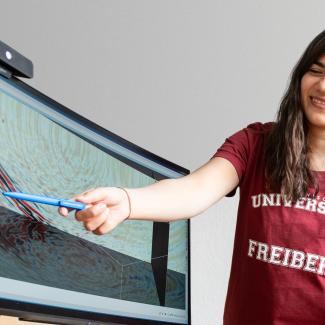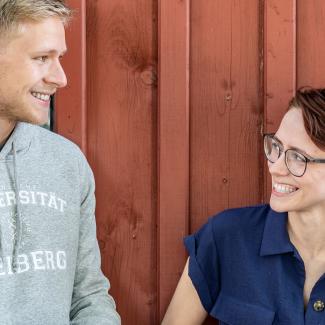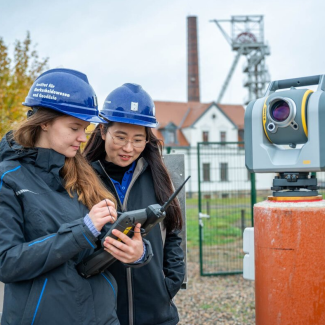Geowissenschaften
The aim of the Master's degree programme is to build on a geoscientific Bachelor's degree to train flexible geoscientists at a demanding, modern level. They should be equipped with solid basic knowledge of geosciences and other natural sciences as well as practical professional skills. In their chosen specialisation, they should be specialists, versatile and able to cooperate. In addition, they should be able to manage projects independently and take on leadership responsibility.
The students should be enabled and motivated to apply their knowledge and skills in a performance-orientated manner, independently and as part of a team, to solve their professional tasks from the perspective of overall responsibility as a geoscientist, from the geosphere to the biosphere to materials science. The promotion and further development of communication and personality traits also play an important role in this.
Study programme
Students have the choice between two possible study programmes:
- a broad geosciences degree, in which students are free to choose their curriculum from the module portfolio of all study specialisations,
- a degree programme with a choice of study specialisation.
Please note that this is a German-language degree program. At TUBAF we offer a variety of English Master's degree programs. Click here for an overview.
Study specialisations
Sedimentology/Palaeontology
The focus is on understanding the interrelationships and process dynamics of the lithosphere, biosphere, hydrosphere and atmosphere and their evolution in the Earth's history. The aim of the programme is to provide students with the skills to reconstruct fossil habitats and depositional environments, material cycles and climatic conditions and to be able to place these reliably in a chronological framework. The development and independent application of interdisciplinary approaches enables a better understanding of the development of the Earth system.
A high proportion of practical training includes field and laboratory work and is geared towards the national and international employment of graduates in industry and business as well as in scientific research institutions, museums and authorities (e.g. state geological offices, environmental agencies).
Tectonics/structural geology
The Structural Geology/Tectonics specialisation teaches the deformation of the solid Earth from the microscopic to the planetary scale. The subject-specific courses cover topics such as various deformation mechanisms, the analysis of deformation structures from terrain and map observation to thin sections, plate tectonics and magmatic processes, or the mechanical principles of the deformation of solids. The degree programme places considerable emphasis on training in disciplines that are relevant to the reconstruction of tectonic processes: Rock science, geochemistry, isotopic age determinations and thermochronology. The programme also includes courses on mathematical modelling of deformation and tectonics. Students receive basic field training; in particular, we offer Master's theses with a strong field focus in Saxony or outside of Saxony, for example in the Alps. At the end of their studies, students should be able to quantitatively analyse deformation structures at different scales. They should have the theoretical knowledge to use these observations to reconstruct tectonic processes and apply advanced methods independently. This includes in particular geochemical and petrological methods. They should also be able to analyse complex regional geology in time and space through their own field work and master the relevant tools, for example for creating geological profiles. In our experience, these skills are also in high demand in the private sector.
Hydrogeology
The Hydrogeology degree programme teaches the fundamentals and research methods for the protection and use of groundwater. In hydrogeology, this includes the teaching of knowledge and skills for the description and calculation of groundwater flow, including numerical groundwater flow modelling. The second focus is the theoretical and practical teaching of hydrochemical interactions between water, rock and water constituents. This is supplemented and consolidated by practical field investigations, analytical laboratory work and hydrochemical modelling.
The aim is to enable students to link the mathematical and scientific relationships with the geological system and to gain a basic technical understanding of hydrogeological processes. At the same time, the latest technical methods, analytical-laboratory procedures and numerical models are taught to enable students to get a good start in engineering offices, agencies and authorities, as well as to lay the foundations for a successful scientific career.
Engineering geology
The Engineering Geology degree programme teaches skills for the structural use of the subsurface, protection against geological hazards and the sustainable protection of the earth's upper crust. To this end, proven and new investigation methods are taught and fields of application are identified. The specific objectives of engineering geology teaching are the acquisition of knowledge and skills for the geotechnical characterisation of loose and solid rock, for subsoil exploration and for the development of subsoil models. In addition, students should be able to analyse subsoil risks and natural hazards and derive suitable measures to control them. A further aim is to acquire skills in the field of environmental geology so that students can apply solution-orientated methods in the areas of contaminated sites, landfills and old mining.
Students should be able to link mathematical and scientific relationships with the earth system and gain a basic technical understanding of engineering geological approaches. At the same time, the latest technical procedures, laboratory and field methods as well as numerical models are taught to enable students to gain a good start in engineering offices, agencies and authorities on the one hand and to lay the foundation for a successful scientific career on the other.
Deposit theory
Students should be able to work independently on complex geological issues in science and practice. This includes three areas: Ore deposits, deposits of solid mineral non-ore raw materials (natural stones, industrial minerals, salts, precious stones) and deposits of fossil organites (coal, crude oil, natural gas). Students should learn to evaluate these deposits from a mining geological perspective, to investigate their genesis and to explore deposits. The course focuses on methods of exploration and evaluation of ore, non-ore, coal and hydrocarbon deposits. Other module focuses include topics on petrological and geochemical processes as well as palaeontological, sedimentological and tectonic issues. Geophysical, mining and deposit technology subjects are taught in the engineering geology modules of the degree programme. Students will also gain experience in the fundamentals of processing and metallurgy. In addition, students should be able to solve environmental and mining law problems in the context of deposit exploration and mining and to recognise raw material economic relationships.
Mineralogy
Based on their material knowledge of the relationship between the chemical composition, structure and properties of crystals, minerals and rocks, students should acquire a comprehensive understanding of their formation, transformation, stability and utilisation. This should be applicable to questions of material cycles in the geosphere, environment and technology. One focus of the degree programme is therefore the confident mastery of the relevant examination techniques, such as light and electron microscopy, X-ray diffraction, spectroscopy, thermal analysis and chemical element and isotope analysis. In the Institute's large geochemical and mineralogical laboratory, students will learn how to operate the equipment independently. With this training, graduates can perform tasks in the extractive industry (mineral and fossil raw materials), the raw materials processing industry (building materials, glass, refractory materials, residual materials, secondary raw materials) and technology companies (ceramics, abrasives, electronics and semiconductors, crystal synthesis and crystal growing, pharmaceuticals) as well as in environmental authorities, engineering offices, criminal investigation departments, research and teaching institutions and museums. The degree programme enables graduates to take on managerial roles.
- Faculty
-
Faculty of Geosciences, Geoengineering and Mining (Faculty 3)
- Degree
-
Master of Science (M. Sc.)
- Standard period of study
-
4 Semester
- Part-time possible
-
Yes
- Start of studies
-
Winter semesterSummer semester
- Admission requirement
-
- Bachelor's degree in Geology/Mineralogy from TU Freiberg or a professionally qualifying degree in the same degree program at another university or a professionally qualifying degree that is at least equivalent in terms of subject matter with a standard period of study of at least 6 semesters
- . 6 semesters
- Qualification interview
- Letter of motivation
Language requirement
- Application: with at least B1 level German
- Admission to the degree program: with C1 level German (e.g. DSH-2)
- Language courses and DSH exam at TUBAF
- Course language
-
German
Collaboration or project management in various fields of work: e.g. in industrial and consulting companies, exploration and sustainable extraction of raw materials (water, energy sources, ores, construction raw materials), solving geological problems for civil engineering and landfilling of residual materials and waste, assessment and minimization of natural hazards (geohazards), quality control of natural minerals and materials in production, material, and material development
Research and teaching: e.g. scientific career (doctorate)
I studied geosciences at the TU Bergakademie Freiberg for my Master's degree. I was particularly interested in mineralogy, which combines geology with chemistry and physics in a unique way. In addition to basic mineralogical and petrological knowledge and technical mineralogy, I also learned about special analytics in the field of materials research.
Nicole Biedermann - Mineralogist, PhD student at the European XFEL
I associate my time in Freiberg with the camaraderie at the institute and between the students. Although the geosciences at TU Freiberg are globally networked and the institute offers various specializations, it still feels very informal in the labs and working groups. The team spirit, the joint work, and the fact that the faculty members are always ready to listen make the atmosphere unique.
Dr Sandra Herrmann - geologist, research associate on the research vessel JOIDES Resolution for the International Ocean Discovery Program (IODP), candidate for the Analog Astronaut Mission in NASA's Human Exploration Research Analog program


